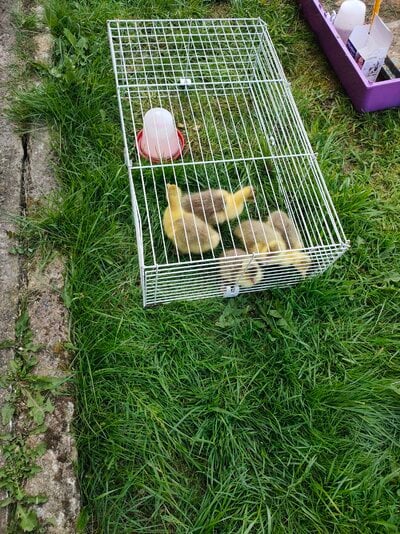JDowey
In the Brooder
- Apr 23, 2021
- 19
- 27
- 49
Over the past two days we've lost two goslings.
So for context, goslings are pilgrims, first time I've had this breed as previously only had Toulouse (which I still have, just wanted to expand in breeds) started with five, they're about 4 nearly five weeks now, starting to feather up abit but v v slow compared to Toulouse but that might be normal idk. They've been off heat for two weeks, outside under a run and in at night for a week. Yesterday we decided to try out all night too considering previously we stuck out Toulouse goslings outside from about 3 weeks and they where grand, only reason we hadn't stuck them out earlier with these ones was we were worried they'd get through the gaps in the goose pen fencing. This morning I went out and one was dead, complete stiff and cold dead, now it had been the runt, I'd noticed it not really eating well, lying down alot when the others where up and about eating and chirping. Was abit bummed but though ah well that's a shame must have been something just wrong with it (seemed to just stop growing at about 3 weeks) assumed because of this the others would be fine. However went out tonight to check on them (10pm my time) and one was floppy but seemed still alive, rushed it into the house but it didn't make it, brought the others in too but they seem fine. The one that was floppy and died also had some Reddy brown liquid come out of its mouth, not sure if from crop or from lungs or what.
Does anyone know what's causing this?? Are they cold and just not ready for outside at night? A disease? Something else ?
Also I live in northern Ireland so the only predators we have are domestic cats and foxes but no sign of these
So for context, goslings are pilgrims, first time I've had this breed as previously only had Toulouse (which I still have, just wanted to expand in breeds) started with five, they're about 4 nearly five weeks now, starting to feather up abit but v v slow compared to Toulouse but that might be normal idk. They've been off heat for two weeks, outside under a run and in at night for a week. Yesterday we decided to try out all night too considering previously we stuck out Toulouse goslings outside from about 3 weeks and they where grand, only reason we hadn't stuck them out earlier with these ones was we were worried they'd get through the gaps in the goose pen fencing. This morning I went out and one was dead, complete stiff and cold dead, now it had been the runt, I'd noticed it not really eating well, lying down alot when the others where up and about eating and chirping. Was abit bummed but though ah well that's a shame must have been something just wrong with it (seemed to just stop growing at about 3 weeks) assumed because of this the others would be fine. However went out tonight to check on them (10pm my time) and one was floppy but seemed still alive, rushed it into the house but it didn't make it, brought the others in too but they seem fine. The one that was floppy and died also had some Reddy brown liquid come out of its mouth, not sure if from crop or from lungs or what.
Does anyone know what's causing this?? Are they cold and just not ready for outside at night? A disease? Something else ?
Also I live in northern Ireland so the only predators we have are domestic cats and foxes but no sign of these




 I also raise Pilgrims and enjoy them immensely.
I also raise Pilgrims and enjoy them immensely.